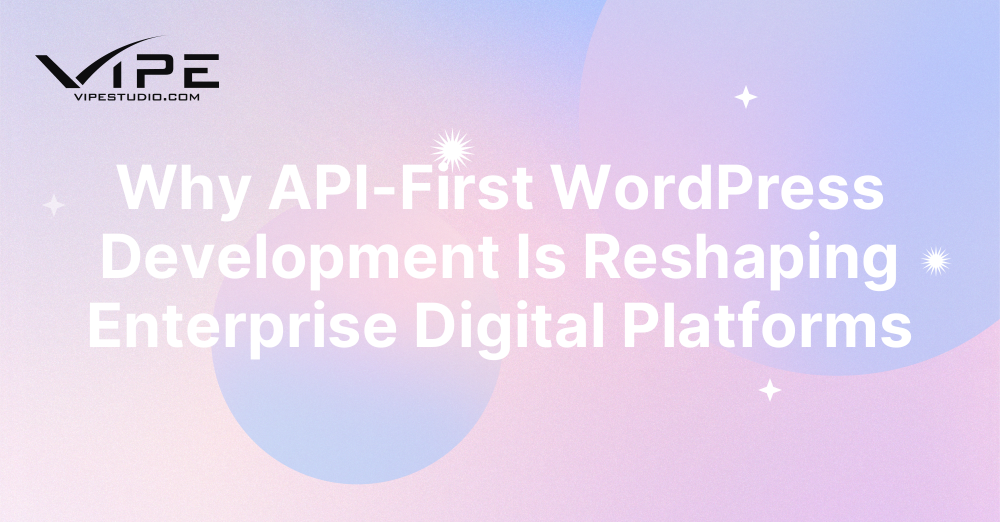18.05.2025
WordPress Development
Why API-First WordPress Development Is Reshaping Enterprise Digital Platforms
READING TIME: MIN
Table of Content
As digital platforms grow more complex, enterprise businesses are increasingly turning to API-first architectures to scale their operations, integrate systems, and future-proof their technology stacks. WordPress, long considered a content management powerhouse, has evolved to meet this demand. Through REST and GraphQL APIs, WordPress now supports enterprise-grade, API-first development that extends far beyond traditional websites.
What it means to take an API-first approach in WordPress
An API-first approach means structuring your backend around clean, well-documented APIs that serve as the primary way applications consume and manipulate data. In the context of WordPress, this means using the REST API or GraphQL to decouple the frontend, connect external services, and enable flexible content distribution across channels.
Instead of tightly coupling your design and data, API-first development allows you to treat your WordPress instance as a content hub—serving websites, mobile apps, kiosks, and third-party platforms simultaneously.
How enterprises benefit from API-driven content workflows
For enterprises managing large-scale content operations, the ability to create once and publish everywhere is critical. API-first WordPress setups enable this by:
- Allowing consistent content delivery across multiple frontends
- Simplifying integration with marketing platforms, CRMs, and analytics tools
- Supporting microservices and modular architecture strategies
This results in streamlined workflows for content creators and more dynamic capabilities for developers and marketers.
Use cases where API-first WordPress offers a competitive advantage
API-first WordPress development is ideal for:
- Multilingual sites requiring multiple frontends and localized content
- Headless setups using React, Vue, or Next.js for the frontend
- Enterprise portals with user authentication and role-based content delivery
- IoT platforms and mobile apps pulling structured content from a centralized CMS
These use cases show how flexible WordPress becomes when treated as a headless content engine.
Building scalable systems with WordPress and GraphQL
GraphQL, an increasingly popular query language for APIs, brings powerful querying capabilities to WordPress when combined with tools like WPGraphQL. Developers can request exactly the data they need—nothing more, nothing less—reducing over-fetching and increasing performance.
For enterprise applications where performance and clarity matter, GraphQL makes WordPress a much more developer-friendly option.
API security and governance in an enterprise WordPress setup
Security is a top concern for enterprises adopting API-first platforms. WordPress supports OAuth authentication, nonces, permission levels, and API tokens to ensure secure access to endpoints. In addition, rate limiting and user role policies can be enforced to meet enterprise compliance standards.
Working with an experienced WordPress partner like Vipe Studio ensures that your API architecture is secure, scalable, and built with long-term governance in mind.
Why API-first is the future of enterprise WordPress development
As enterprises continue to adopt composable architectures and omnichannel strategies, API-first development is no longer optional—it’s essential. WordPress, with its mature ecosystem and developer support, is uniquely positioned to serve as a modern content API, driving experiences across any frontend or device.
Whether you’re transitioning from a legacy CMS or modernizing your digital infrastructure, WordPress offers an open, extensible foundation for API-first delivery.
Ready to build an API-first WordPress solution for your business?
At Vipe Studio, we help enterprises unlock the full potential of WordPress as an API-powered content platform. From headless implementations to custom integrations, we deliver scalable solutions tailored to your business goals. Reach out via our WordPress Inquiry Form to start planning your API-first transformation.
More on The Topic
- WordPress Architecture Decisions and Their Business Impact
- Ecommerce Plugins Eating Time and Sanity
- Content Migration as a WordPress Bottleneck
- Headless WordPress and Headless Communication
- Staging Sites That Reveal Organizational Blind Spots
The content of this website is copyrighted and protected by Creative Commons 4.0.



